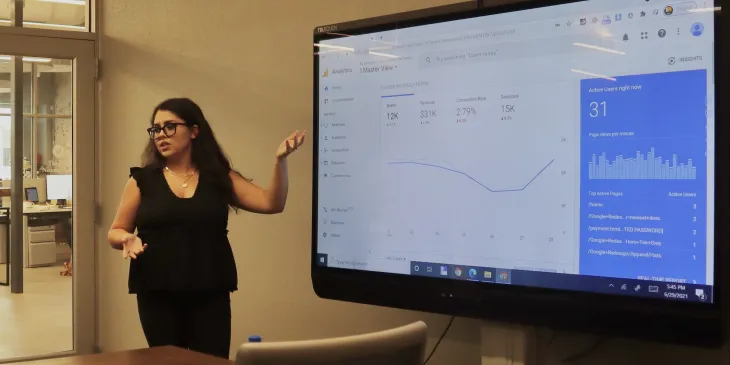ICYMI– Best Practices for Business Finances

For our September Bank & Brews workshop, we were joined by Jennifer Manning, CPA, CGMA & Partner at Pattillo, Brown & Hill, and our very own Lisa Caro, CPA & Senior Vice President at Extraco Banks.
The importance of well-organized business finances cannot be overstated. Keeping accurate and well-organized financial data is critical for knowing the status of your business, filing taxes, and especially when seeking financing from banks. For many businesses, COVID-19 provided a wake-up call about the importance of having accurate and organized financials available at any time. There are many business owners who work very hard and have great businesses but do not always have the records to prove it.
Why Business Finances Matter
1) Taxes - Business owners are obligated to pay taxes not only for their business but for their employees. It is never fun to be surprised by a tax bill and by keeping accurate records year-round, you will be able to plan for state, federal, and payroll taxes.
2) Lending or Investment Opportunities - This year more than ever, we've seen how important it is to have business finances in order. Many small businesses were able to take advantage of COVID-19 funding sources because they were prepared. SBA lending requires stringent documentation to take advantage of disaster loans or other financing opportunities.
Record Retention
Record retention is critical to be able to provide accurate and up-to-date financial records. If your business is audited, you will need to have copies of all records stretching back relatively far. Federal law allows a review of records up to three years old, but if the IRS suspects any errors or fraud, they have the ability to require six years of records.
General ledgers like accounts receivable, accounts payable, payroll, and others should be retained for seven years.
Legal documents like Articles of Incorporation, stocks, deeds, and property information should be retained permanently.
This information should be backed up digitally nightly. Records can be soft or hard copies, but to streamline processes, having an additional digital copy is considered best practice.
View record retention guidelines here.
Policies and Procedures
Policies are written narrative guidelines for conduct within your organization. These guidelines will protect employees and the employers. A common example is a Personnel Policy. This type of policy provides guidelines on sick leave, vacation leave, ethics, social media, and more.
Another example is an Expense Policy. This policy defines what expenses employees can make, what they can submit for reimbursement, and how to expense items.
Authority limits are important to designate levels of authority for different levels of employees within an organization. This policy will set boundaries for each employee and what they can spend or expense. An important feature of authority policies is specifying who has the authority to sign or execute contracts.
Procedures are more detailed specifics on how to perform a task. For example, your accounts payable procedure will speak to exactly how to invoice or process checks. If the primary employee to complete these duties is unavailable, who will complete the tasks? You should have contingency plans for each major role in the event that the employee is unavailalble.
Bookkeeping
Bookkeeping activities include recording all financial transactions of the company. Often, small businesses will use software resources like Quickbooks or Quicken to complete these tasks.
Recorded activities should be adequately supported by information or paperwork. For example, for each accounts receivable line item, you should have the invoice to back it up. When processing payroll, have files available for each employee– W-4 documentation, time sheets, and employee details.
If you rely on a third-party firm for taxes, all of this information will need to be provided. If you utilize a firm like Pattillo, Brown & Hill for financial statements or taxes, be sure to provide all supporting information to provide a clear and full picture of your financial position. This will streamline the process for you, and the firm assisting you, come tax season.
Financial Statements
For business owners using accounting software, they typically use pre-made templates. Quickbooks and others will give pre-formatted statements that are dependent on what information you are providing. When looking for the type of financial statements or line items you need, look to the software you are using for resources. Accounting software will often recommend templates based on industry or business type.
When using a firm like Pattillo, Brown & Hill for your financial statements, maximize the time and money spent for their services by bringing as much (accurate) information as you can. Time not spent by the firm organizing or collecting data can instead be used to make very helpful (and often profitable) recommendations.
Jennifer Manning has two golden rules for business owners– 1) keep business and personal assets separate and 2) stay on top of your payroll taxes. By mixing personal and business transactions, you will not be able to get a clear picture of your business finances. Always keep a separate business bank account! As for payroll taxes, the IRS does not provide flexibility. It is much easier to maintain them regularly than it is to go back and attempt to remedy what you owe.
Here are two common and helpful financial statements that Jennifer and Lisa recommend:
- A great tool to compare your business standing year-to-year
- Shows assets and liabilities at a specific point in time (ex. business status as of 12/31/19)
- Assets are shown in order of liquidity (how quickly can they become cash)
- Example: Cash, CDs, Accounts Receivable, Inventory, Equipment, Furniture, Building Improvements, Land, etc.
- Liabilities are listed by Current and Long-Term
- Example: Accounts Payable, Credit Card Payable, Payroll Taxes Payable, Sales Tax Payable, Note Payable (Bank)
- Owners Equity is the book value of your assets subtracting all liabilities
- Example: If you had to get rid of everything right now, what would you have left.
- Shows revenues and expenses over a specific period of time (ex. the year ending 12/31/19)
- Revenue - Cost of Goods Sold (costs of doing business) = Gross Profit (profit before any overhead costs)
- Gross Profit - Operating Expenses (overhead) = Operating Income
- Operating Income +/- Other Income/Expenses (ex. Interest Income, Misc Income, Interest Expense) = Net Income
- Use the Income Statement to make sure your Balance Sheet is balanced
- Assets = Liabilities + Owners Equity
Once your financial statements are assembled, use this Financial Statements Checklist to confirm your statements are correct. This tool will also help you confirm that all financials are reconciled across documents.
Understanding finances can feel daunting to business owners. By staying organized and up-to-date on business financials throughout the year, you'll avoid the panic come tax season or when an investment or lending opportunity arises.
Information about Bank & Brews
In partnership with StartUp Waco, Bank & Brews is designed for anybody who wants to learn more about starting or growing a business! These monthly events are free and are now hosted virtually via Zoom Webinar. Visit Extraco's Facebook page to learn more about upcoming Bank & Brews!
About Extraco Banks
Extraco Banks and its affiliate companies are dedicated to building people, businesses and communities. Since the Great Recession, Extraco has extended over $2.5 billion in loans to 25,000 customers, while financially supporting over 1,275 community organizations working to create economic vibrancy, job growth and overall quality of life to our communities across central Texas. Founded as a cotton warehousing company, Extraco, at $1.5 billion in assets, is the largest and most comprehensive locally owned bank between Dallas and Austin, serving over 120,000 customers banking, mortgage, insurance and wealth & trust needs with creative and innovative excellence.
Learn more at: https://www.extracobanks.com/.




